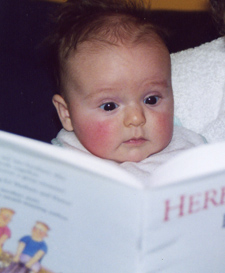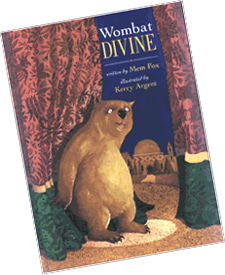by Christine Jensen
What was your favourite book as a child?
It's amazing how many books we can remember, once we start thinking about it. I vividly remember reading the latest Enid Blyton in the back of the toyshop my mother worked in (being careful not to bend the spine back as it had to go back on the shelf). My dad read me Blinky Bill and to this day I can see Blinky covered in flour, stealing lollies from the shop.

Jenny Tabakoff, in an article in the Sydney Morning Herald, writes,
When you read a good book as a child, it becomes not only part of your being (and no, seeing the film is not the same thing), but also part of society's common culture. If you ask me what I am, I am bits of every book I read as a child. The fiction you read as an adult never inhabits you in the same way. (1)
She goes on to say that this is why it's important to read classics at an early age.
A good book is a treat, magic, a grand adventure. It widens your world both factually and creatively. Best of all, books become your friends and companions. This is why reading to children is time well spent"”in families that read together, books become wonderful shared memories. Different families may choose to do this in different ways. A special time can happen just before bed, after the bath, or round the table as the children get older.
Listening to story tapes can be a great way of "reading', but hearing mum or dad read in their own way is rather special. My children remember dad reading them Ballet Shoes by Noel Streatfield while waiting for the NRMA on a cold, wet, day (which, with some poetic licence, had become Bullet Boots).
As the children got older these reading times came in the school holidays. I remember reading Act 1 of Macbeth with everyone taking a different part so we could experience Shakespeare first hand (I was the three witches!). And it's never too early to start. For a child, sitting on your knee, surrounded by your arms and hearing your voice is an enriching experience. For young children, there are wonderful "board' books available, including many with lift-up flaps. Dear Zoo by Rod Campbell is a favourite. There's also a Lift the Flap Bible (2), which is great fun. Often the test of a good book is to read it aloud.
As we read to children we are helping them to explore and understand their feelings. In Dogger, by Shirley Hughes, the characters experience sadness, loss, frustration, as well as great kindness, love, and generosity. Harry the Dirty Dog shows Harry struggling with his identity.
Abstract ideas like bravery, courage and selflessness can be hard to explain, and yet an author like Katherine Patterson does this skilfully. With equal skill, E. B. White's Charlotte's Web shows the remarkable gift of sacrifice and love. The struggle between good and evil is played out in many well known stories, such as Cinderella, The Famous Five series, C. S. Lewis' Narnia Chronicles and, more recently, the Harry Potter series.
By reading we also discover the English language and how to use it. You'll notice a child suddenly adopting an unusual turn of phrase, only to realize it has been "lifted' straight from their favourite book. At the moment one of my grandchildren keeps repeating "Oh, no!" from We're Going on a Bear Hunt (3), and I remember the time one of my children starting to write their creative writing at school in the style of Damon Runyon"”complete with clipped Brooklyn accent! (Guys and Dolls is one of his short stories).
What makes a good book? Mem Fox, an Australian children's writer (Possum Magic), says:
A really good book changes a child. The rhythm of the words has to be perfect, the illustrations have to be exquisite and the characters very likeable. In fact everything in children's books has to be better than in adult's books. (4)
Christian children's books are not exempt from these high standards. Christian fiction is not easy to write well, and often risks becoming sentimental or moralistic. But it can be done"”Patricia St John's books Treasures of the Snow and The Tanglewood's Secret are fine examples of Christian children's writing. And authors like Madeline L'Engle (A Wrinkle in Time) and Katherine Patterson (Bridge to Teribithia and Jacob I have Loved) are authors whose Christian world view is reflected in their writing, while writing for the secular market.
There has always been a great selection of Christian biographies, written especially for children. These are a powerful way of communicating what it means to serve the Lord Jesus. If you've ever read the story of Mary Jones and her Bible(5) you'll find it hard to take having a Bible of your own for granted. Recently a group of books for children have been published, each containing ten short biographies, and these are great for showing the power of the gospel to change lives. (6)
At Christmas and Easter there are some wonderful books to read that convey the gospel. Nativity, illustrated by Julie Vivas, is the text of the King James translation of Luke's gospel. Vivas's illustrations convey the reality of Jesus' birth. She has great illustrations, for example, of Mary eight and half months pregnant travelling down to Bethlehem, or of Mary looking totally exhausted after giving birth.

These times of the year are a great opportunity to begin family traditions. An annual reading of The Best Christmas Pageant Ever by Barbara Robinson is not to be missed"”no Christmas pageant will ever be the same again after reading it. And for an Australian view, Wombat Divine by Mem Fox shows a rather special nativity play with a most memorable line: "a nativity without the baby Jesus is no nativity at all."
Reading can encourage children to ask questions about all aspects of life, like the four or five-year-old, obsessed with dinosaurs, who asks, "How do you become a skeleton?" (That was a tricky moment for me.) Children's questions can go very deep. As Christians we have a world view: we believe that God created the world, that "all have sinned and fall short of the glory of God", and that in the death and resurrection of Jesus there is hope and forgiveness. This framework enables us to answer some of those questions about life, the world, and death. "Will my dog be in heaven?" "Who made me?" "Who made God?" "Does God know what I think?" "Where is Granpa?" (Granpa by John Burningham, deals with the death of a grandfather, and Our Granny by Margaret Wild has Granny wearing Grandpa's old red jumper with the holey sleeve, because Grandpa is dead and she often thinks about him.)
As children develop, they read books that confront life as it is, and it is good to go on that journey with them"”to read their books, discuss them, ask the hard questions and let them ask the hard questions too. Some will bring home books and you'll wonder if they're too young for reading such things. This happened in our house and I promptly hid the book. Well, another one appeared and I hid that and then another and another. I ended up with five copies! I realized it would be much better if we read and confronted the book together rather than trying to bring in such censorship.
Children occasionally stumble on good books by themselves, but we have a great opportunity to guide and share with them the great treasures of literature. It's a wonderful adventure to begin from a child's earliest days. But sharing God's word is an even greater adventure.
There are a number of booklists available with suggestions of which books are suitable for each age.
ENDNOTES
:
1. Jenny Tabakoff, "Heffalumps and bum thieves', Sydney Morning Herald, 7 January 2003.
2. Tracey Moroney and Sally Lloyd-Jones, Lift the Flap Bible, Reader's Digest, 2000.
3. Michael Rosen, We're Going on a Bear Hunt, Board Book edition, Walker, London, 1997.
4. Richard Jinman, Sydney Morning Herald, 20 March 1998.
5. Mary Ropes, Mary Jones and her Bible, Christian Focus, Fearn, 2002.
6. Irene Howat, Ten Boys Who Made a Difference, and other titles in the series, Christian Focus, Fearn, 2002.
SUGGESTED READING
:
Hunt, Gladys
Honey for a Child's Heart, Zondervan, Grand Rapids, 1978.
Honey for a Teenager's Heart, Zondervan, Grand Rapids, 2002.
Honey for a Woman's Heart, Zondervan, Grand Rapids, 2002.
Hughes, Kent and Barbara, Disciplines of a Godly Family, Crossway, Wheaton, 2004.
Fox, Mem, Reading Magic: how your child can learn to read before school"”and other read aloud miracles, Pan, Sydney, 2004.
French, Jackie, Rocket Your Child into Reading, Angus and Robertson, Pymble, 2004.
Jennings, Paul, The Reading Bug, Penguin, Camberwell, 2003.



















